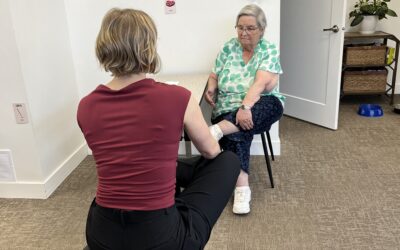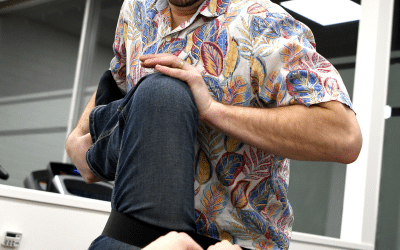SPECIALIZED VESTIBULAR REHABILITATION SERVICES
Expert Treatment for Dizziness, Imbalance, and Vertigo in Prince George
At Altea Physiotherapy + Wellness, we specialize in vestibular rehabilitation and understand the debilitating impact that these conditions can have on daily life. We are committed to providing effective treatment and management strategies to reduce symptoms and improve quality of life. Vestibular rehabilitation is used to treat inner ear and brain disorders that can cause symptoms like dizziness, imbalance, vertigo (false sense of spinning), and visual disturbances like trouble reading. Our goal is to provide our patients with effective treatment and management strategies to improve their quality of life and reduce their symptoms. Our experienced physiotherapists are trained to assess and treat a wide range of vestibular disorders, including:
- Benign Paroxysmal Positional Vertigo (BPPV)
- Labyrinthitis
- Vestibular Neuritis
- Vestibular Migraine
- Meniere’s Disease
- Age-Related Imbalance/Dizziness
- Motion Sensitivity
- Concussions and Post-Concussion Syndrome
SPECIALIZED VESTIBULAR REHABILITATION SERVICES
What Can Vestibular Rehabilitation Help With?
- Dizziness
- Vertigo (False Sense of Spinning)
- Imbalance
- Visual Disturbances (Trouble focusing on objects or words)
- Increased symptoms when in busy environments
- Sensitivity to Movement
- Light-headedness
- Brain Fog or feeling confused easily
- Headaches
- Head pressure
First time to Altea?
What To Expect During A Vestibular Rehabilitation Session
You’ll first require an initial assessment, during which our physiotherapist will conduct a thorough evaluation to assess your balance, dizziness, and any visual disturbances. The vestibular rehabilitation assessment will take 60 minutes. You will be asked several questions and taken through several tests to assess your inner ear and brain. VNG (Videonystagmography) or infrared goggles will also be used during your assessment. These look quite similar to virtual reality goggles and they eliminate any light. The lack of light will let the physiotherapist see certain eye movements and diagnose certain inner ear disorders more easily.
After your assessment is complete, a recovery program will be designed according to your specific needs. This may include a variety of techniques such as vestibular rehabilitation exercises, manual therapy, postural and balance training, and patient education. Our goal is to empower you with the tools and strategies needed to manage your symptoms and improve your quality of life. Carly and our team will guide you through recovery and get you back to doing the things you love.
Resources:
Balance and Dizziness Canada- www.balanceanddizziness.org
Vestibular Disorders Association- www.vestibular.org
FAQ
Frequently Asked Vestibular Rehabilitation Questions
Q: What is vestibular rehabilitation?
A: Vestibular rehabilitation is a specialized form of physical therapy that focuses on treating inner ear and brain disorders that can cause dizziness, vertigo, and other balance problems.
Q: Who can benefit from vestibular rehabilitation?
A: Vestibular rehabilitation can benefit anyone who is experiencing symptoms related to inner ear or brain disorders, such as dizziness, imbalance, vertigo, and visual disturbances.
Q: What kinds of conditions can vestibular rehabilitation help with?
A: Vestibular rehabilitation can be effective in treating a wide range of conditions, including BPPV, labyrinthitis, vestibular neuritis, vestibular migraine, Meniere’s Disease, age-related imbalance/dizziness, motion sensitivity, and concussions/post-concussion syndrome.
Q: What happens during a vestibular rehabilitation session?
A: During a vestibular rehabilitation session, a trained physiotherapist will assess your symptoms and develop a personalized treatment plan. Treatment may involve a variety of exercises and techniques to improve balance, reduce dizziness, and improve overall function.
Q: How long does vestibular rehabilitation take?
A: The length of vestibular rehabilitation treatment can vary depending on the individual and the condition being treated. Typically, treatment will involve several sessions over a period of weeks or months.
Q: Is vestibular rehabilitation covered by insurance?
A: Many extended health plans do cover vestibular rehabilitation under physiotherapy benefits, but coverage can vary depending on your specific plan. At Altea, we can help you navigate the insurance process and determine your coverage. We also direct bill most insurers.
Q: Is vestibular rehabilitation painful?
A: Vestibular rehabilitation exercises should not be painful, although some may cause mild discomfort or dizziness. Your physiotherapist will work with you to ensure that exercises are safe and effective.
Q: Can vestibular rehabilitation help prevent falls?
A: Yes, vestibular rehabilitation can be an effective way to improve balance and reduce the risk of falls in older adults and other individuals with balance problems.


